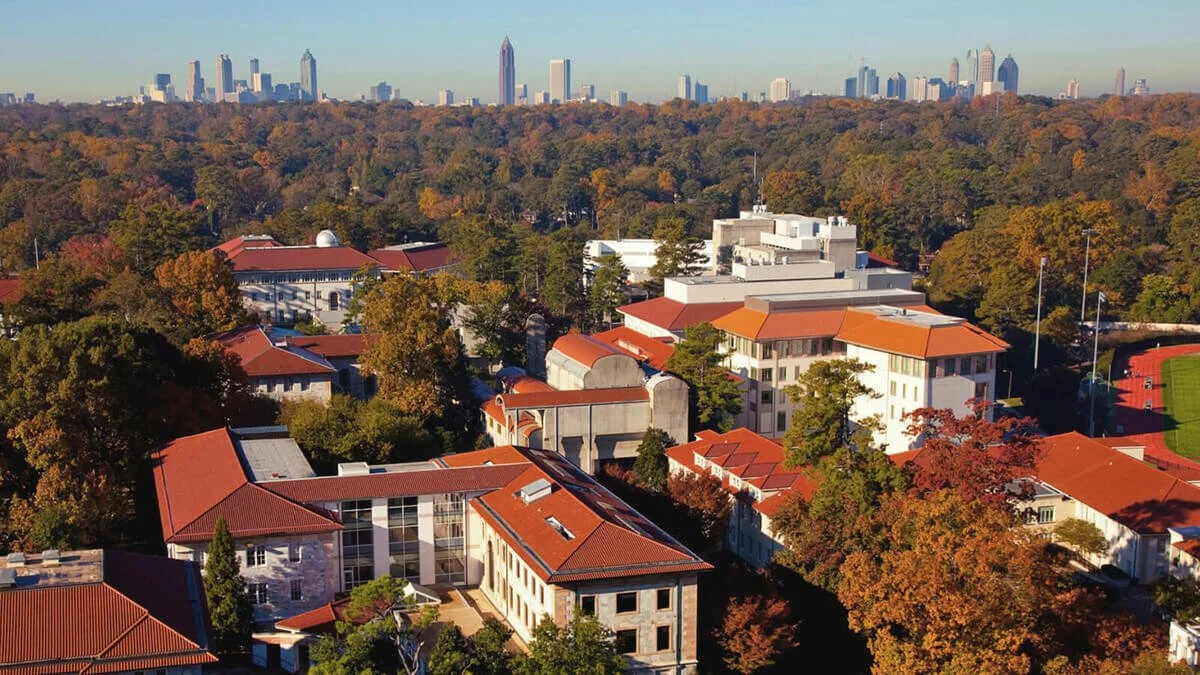The Pros and Cons of Emory
What is Emory’s reputation?
“excellent for pre-med and public health” “beautiful campus” “15 minute drive to Atlanta” “suburban location” “lots of wealthy students” “great undergraduate business school” “strong pre-professional vibe” “more than 40% of students start out pre-med” “big Greek scene” “very serious students” “diverse but segregated” “not much school spirit” “no football team” “not a lot of social life” “very liberal for a Southern school” “great dorms” “subpar dining hall food” “Atlanta weather is hit-or-miss” “very strong writing programs” “almost 60% female” “mostly collaborative”
Emory is a Top 25 university that’s located in the suburbs of Atlanta, about 20 minutes away from the city. It’s a mid-sized private university with about 7,000 undergraduates. And it’s known primarily as one of the best schools for pre-medicine or public health, and for its world-class research in a variety of medical-related fields, including: epidemiology, vaccines, Alzheimer’s, cancer research, biomedical engineering, PSTD, HIV, environmental health, global health policy, behavioral science, etc.
In addition, it has the #1 undergraduate nursing program in the nation, and a Top 15 rated undergraduate business program. Both of these programs are “delayed admissions” programs, which means you apply sophomore year at Emory to start as a junior, but virtually all students are admitted as long as they maintain a decent GPA.
Emory: 1 School with 2 Campuses
When you apply to Emory as a freshman, you can apply to Emory College, which is the main campus near Atlanta, or you can apply to Oxford College, which is a much smaller campus about 45 minutes away. (Or you can apply to both.) They’re both part of Emory University. So what’s the difference?
The vast majority of students are on the main campus, and that includes three-quarters of all undergraduates plus all graduate students. Everything is there, including frat row, and all seven graduate schools. But freshman and sophomores have the option to spend their first two years at the much smaller Oxford campus, which has only about 1,000 students total.
The emphasis of the Oxford campus is on liberal arts, which means they really encourage you to take a variety of classes before settling on a major. And the benefit of Oxford is that you’re part of a really small, tight-knit community, and instead of having big lecture classes, you have small, discussion-based seminars. And you also have easy access to all of your professors, who get to know you by name, because those professors specifically want to teach undergraduates. It’s a very personalized experience, and because of the smaller size, students are able to take on a lot of leadership roles. Then, after two years, you seamlessly transition to the main campus with a solid group of friends in place, and you eventually graduate with the same Emory degree as everyone else.
So if you want a bigger university, you want to be closer to Atlanta, and you want to be in the center of it all, the main campus is better. But if you want the individualized experience of a small liberal arts college in a more rural setting for your first two years of college, Oxford is a great option.
NOTE: 1) Emory College and Oxford College review applications independently, using completely different admissions committees, so applying to one doesn’t impact your chances of getting into the other one at all. 2) They have nearly identical acceptance rates, so neither one is easier to get into. And most applicants apply to both.
The Pros of Emory…
#1: Pre-med and Public Health — Emory’s campus is literally right next door to some of the best medical facilities in the country, including: Emory University Hospital, Emory School of Medicine, Children’s Healthcare of Atlanta, Emory National Primate Research Center, the Winship Cancer Institute, and the CDC: Centers for Disease Control. That means undergraduates have unparalleled access to top professors, research, labs, and shadowing opportunities in almost every major health field. It’s hard to do better than that.
#2: Access to Atlanta — The city of Atlanta is about 15 minutes away and offers a wide variety of cultural, entertainment and employment options. It’s a very diverse city, and it’s particularly strong in a variety of business sectors, including: tech, media, music, and healthcare. It’s also extremely easy to fly into Atlanta from almost anywhere; it’s the busiest airport in the world. And while Atlanta definitely have some major crime issues, Emory’s campus and the surrounding suburban neighborhood are both quite safe.
#3: Diversity — Like the city of Atlanta itself, Emory is known for having quite a bit of ethnic diversity. It has a large international population of about 15%, and a large Black population of about 13%. It also has a large Jewish population, mostly from the New York area, and a large Korean population. On the socioeconomic side, Emory definitely has a reputation for attracting a lot of very wealthy students.
#4: Goizueta Business — Emory has a Top 15 ranked undergraduate business program. Unlike a lot of undergraduate business programs that are four years, Goizueta (goy-ZWETTA) is only two years, so you typically apply sophomore year on campus to start as a junior. This is called delayed admissions, as opposed to direct admissions, which is when you get in straight out of high school.
Business programs that are delayed admissions sometimes get a bad rap because there’s no guarantee that you’ll get into the program. And at schools like UNC, UVA and Wake Forest, more than half the students are denied. But at Emory, applying to the program is more a formality than anything else; as long as you’ve taken certain prerequisites and maintained a decent GPA, you’ll get in. About 95% of applicants each year are admitted.
It’s worth noting that Emory does accept a very small number of students into their business program straight out of high school, but only about 6 or 7 incredible students each year, called Goizueta Scholars. Not only do these students get to start taking business classes right away, but they get a ton of scholarship money too. To apply for the Goizueta Scholars Program at Emory University, simply submit your Common Application by November 15 (or November 1 for Early Decision I), indicate interest in merit scholarships, and no additional materials or nominations are required.
#5: Emory Scholars — Emory also has a highly-selective Honors Program. While it doesn’t offer special honors-only courses like at some other schools, it does come with a number of nice perks including early class registration, priority housing, special seminars, and really big scholarships that might pay your entire tuition. To be considered, you must submit your Emory application by November 15—regardless of whether you’re applying Early Decision I, Early Decision II, or Regular Decision—and simply check the box indicating interest in merit-based scholarships; no separate essays or application are required.
The Cons of Emory…
#1: Emory Bubble — While Emory is technically located in Atlanta, it’s really not. It’s located in the suburbs a good 15-20 minutes drive away, and there’s not a lot of great public transportation near campus, so it really helps to have a car. (Unfortunately freshmen aren’t allowed to have a car on campus.) Just know that it takes some effort and planning to get into the city: you can see the city skyline from campus, but it’s definitely not an urban school.
#2: Clairmont Campus: Emory has a main campus, and then about a mile away is the Clairmont Campus, where is the residential campus for upperclassmen and graduate students. It’s really nice; it has beautiful apartments with kitchens; it has its own gym and even an outdoor Olympic-sized pool. But there’s no traditional dining hall, and you constantly have to shuttle back and forth to main campus, which can be a bit of a hassle. It’s about a 20 minute walk, or a 5-minute shuttle.
#3: Racial Segregation— While Emory is undeniably diverse, some say that students tend to self-segregate based on race. In the dining hall, for example, you’ll frequently see clusters of people eating together who all look alike. There’s the white table, the Asian table, the Black table, etc. You really have to make an effort to integrate more.
#4: Lack of Social Life — Students at Emory tend to be very studious and career-focused. It has a strong pre-professional vibe. Greek life is prominent — about 30% of students belong to a house — but outside of the Greek system, students complain there’s not much to do socially. There’s no football team, there’s not a lot of school spirit, so you often have to make your own fun.
How to get into Emory…
#1: Apply ED— Emory offers three application options: Early Decision I (Nov. 1), Early Decision II (January 1), and Regular Decision (January 1). ED I and ED II are both binding, but ED I in particular offers a significant admissions advantage. Compare the acceptance rates: 30% for ED I, 12% for ED II, and 10% for RD. So if you know you want to go to Emory, you should absolutely apply ED I. It’s also helpful to know that Emory fills as much as 72% (!) of its freshman class with ED applicants, so if you wait to apply RD, more than 70% of the seats will already be taken.
#2: Apply to Both Campuses — Remember, Emory has two distinct undergraduate campuses for freshmen: Emory College, which is the main campus, and Oxford College, which is a much smaller campus for freshmen and sophomores 45 minutes away. These two colleges review your application independently, so if you apply to both, you double your odds of getting in. And if the main campus is your first choice, as it is for many students, applying to Oxford won’t in any way diminish your chances of getting accepted to the main campus; it just gives you a good backup option.
NOTE: Emory and Oxford have nearly identical acceptance rates, and the majority of applicants apply to both colleges.
#3: Transfer - Emory has a very high transfer acceptance rate of 33%. So you can do two years at a community college and save a ton of money, or do one or two years at some other private university, and then apply to transfer. You should note, however, that Oxford College doesn’t accept transfers.
Emory is located in the safe, suburban neighborhood of Druid Hills, about 5 miles northeast of downtown Atlanta, or about a 15 minute drive away.
Many students are drawn to Emory for the strength of its pre-med and pre-health programs, which give them direct access to cutting-edge research and lab facilities.
Emory’s campus is surrounded by an astounding array of world-class medical research facilities, including the Emory National Primate Research Center, which conducts studies on everything from memory to infectious diseases to organ transplantation.
Emory is known for having quite a bit of diversity, though students tend to self-segregate into ethnic groups.
Students seeking a smaller, tight-knit community can spend their first two years on the Oxford College campus, and then transition to the main campus starting junior year.
Most upperclassmen live on the Clairmont Campus, which is about a mile away from main campus, and features apartment-style living and a big outdoor pool, which is nice in the Atlanta heat.
Emory doesn’t have a football team and isn’t particularly known for its school spirit; campus life tends to be a bit subdued and serious, though there is an active Greek scene.
A few miles from campus (a 5-minute free shuttle) is the small, artsy town of Decatur, known for artisanal coffee shops, boutiques, street musicians, indie bookstores, LGBTQ+ friendly events, arts festivals, and farm-to-table restaurants. Eddie’s Attic is a famous acoustic venue that launched the careers of John Mayer and the Indigo Girls.








